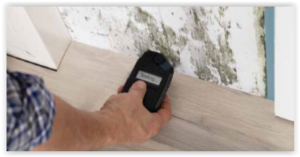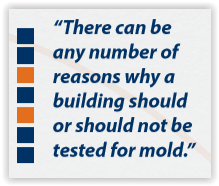To Test or Not to Test
WHEN YOU SHOULD CALL AN IAQ CONSULTANT
 When I get called out to a job site, the occasional property manager will ask, “Do I need to check for mold, too?” To which I respond, “That depends. Can you see mold growing anywhere? Because if so, we probably don’t need to bother with a test.”
When I get called out to a job site, the occasional property manager will ask, “Do I need to check for mold, too?” To which I respond, “That depends. Can you see mold growing anywhere? Because if so, we probably don’t need to bother with a test.”
There can be any number of reasons why a building should or should not be tested for mold. To start, if you can see the signs literally growing on the wall, there’s no need to test. In my experience, whether or not a building needs to be tested for mold can also depend entirely on what sort of building it is.
When I do IAQ work in federal buildings, 98 percent of the time, they will not have me test for mold because — and this may surprise you — there’s no scientific evidence to support a link between mold and adverse health effects. There are studies that suggest damp environments may cause respiratory illnesses, but nothing definitive enough to demand that federal agencies be required to pay for this sort of testing.
Meanwhile, when I visit a commercial highrise building, I will almost always test for mold, especially if a tenant has voiced concerns. In these buildings, tenants are paying a great deal of money to be there. Building managers and property owners usually want to tackle concerns before they have the chance to become real problems. They want to reduce any fears their tenants might have about the building being “unsafe.”
 Then there’s a third scenario, which involves multifamily properties, such as apartments. Their philosophy differs, generally speaking, on what their budget will allow. These buildings typically charge renters $1,000–$1,500 a month. If they bring me in to conduct a mold test, they will essentially give me a month’s worth of rent to cover the bill. However, if a renter has already paid another consultant to test for mold, the building manager may request a test if they need to contest the results.
Then there’s a third scenario, which involves multifamily properties, such as apartments. Their philosophy differs, generally speaking, on what their budget will allow. These buildings typically charge renters $1,000–$1,500 a month. If they bring me in to conduct a mold test, they will essentially give me a month’s worth of rent to cover the bill. However, if a renter has already paid another consultant to test for mold, the building manager may request a test if they need to contest the results.
Outside of the type of building I’m working in, getting a second opinion is another reason why property managers will spring for mold testing. You would not believe how often I run into tests a tenant has paid for that were conducted by someone underqualified or unlicensed!
Earlier this year, I ran mold tests for the property management of a multifamily complex because one tenant paid for their own tests. I happened to look into the company they used, and I suspect the number they called actually goes to a marketing company in Florida. That company then hired a local consultant to come out. In this particular situation, the tests were run in April 2017 by a consultant who just got his license in Feb. 2017. Someone that new to the industry doesn’t yet have the experience to know exactly what you need to look for and how to identify valid results. When you’re faced with a mold complaint, you want to be sure the results you’re looking at are truly reliable.
Ultimately, there’s no one-size-fits-all solution. Whether or not you need to test your building for mold depends on who your tenant is, the nature of the complaints, what your budget can allow, and whether or not you’re sure it was done right the first time.

